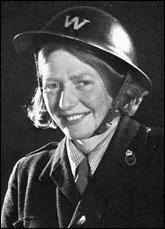Barbara Nixon

Barbara Nixon was born in Churchdown, Gloucestershire, on 16th February, 1907. She studied English at Newnham College. During her time at Cambridge University Barbara met the academic, Maurice Dobb, who she married in 1931. (1)
Dobb was a long-term member of the Communist Party of Great Britain but Nixon was active in the Labour Party and held a seat on London County Council while pursuing a career in acting. Nixon appeared in 1066: And All That (1939). She also wrote plays and O Mistress Mine was produced in 1939. (2)
In May, 1940, she became a volunteer part-time Air Raid Warden (ARP) in Finsbury. (3) Nixon kept a diary during the war and on Saturday 7th September, 1940, she described the first German bombing raid on London that later was described as the Blitz, when 300 German bombers and 600 escorting fighters arrived over London. Although four miles away she could see that the people in "the East End were getting it... we could see the miniature silver planes circling round and round the target area in such perfect formation that they looked like a children's toy model of flying boats or chair-o-planes at a fair... Presently we saw a white cloud rising; it looked like a huge evening cumulus, but it grew steadily, billowing outwards and always upwards... The cloud grew to such a size that we gasped incredulously; there could not ever in history have been so gigantic a fire." (4)
Barbara Nixon saw her first bomb victim soon afterwards: "In the middle of the street lay the remains of a baby. It had been blown clean through the window and had burst on striking the roadway. To my intense relief, pitiful and horrible as it was, I was not nauseated, and found a torn piece of curtain in which to wrap it." (5) Eventually she was appointed as one of the first women to become a full-time warden and received the sum of £2 5s a week. (6)
Nixon served in two posts at opposite ends of the borough. At Post 2 "we had a variety of trades, from railway workers, post office sorters, lawyers, newspapermen, garage hands, to a few of no very definable profession". At Post 13, there was a small-time burglar and three men who had joined because the race tracks from which they had earned a dubious livelihood were now closed, and they had thought A.R.P. would be easy money. (7)
Post 13 was a difficult job and it was "unwise" to ask what people had done before the war because, "owing to the fact that race tracks, boxing rings, and similarly chancy means of livelihood closed down at the outbreak of war, there was a large percentage of bookie's touts and even more parasitic professions, in the CD services, together with a collection of workers in light industry, intellectuals, opera singers, street traders, dog fanciers etc. In the early days the Control Rooms were crowded with chorus girls." (8)
After the war Nixon returned to work as an actress and appeared in Tons of Money (1947), A Word in Your Eye (1947), Fortunato (1947), Lovers' Meeting (1947), Home and Beauty (1948) and BBC Sunday-Night Theatre (1950). (9)
Barbara Nixon died in Fulbourn, Cambridgeshire, on 5th June, 1983.
Primary Sources
(1) Barbara M. Nixon, Raiders Overhead (1943)
The East End were getting it... we could see the miniature silver planes circling round and round the target area in such perfect formation that they looked like a children's toy model of flying boats or chair-o-planes at a fair... Presently we saw a white cloud rising; it looked like a huge evening cumulus, but it grew steadily, billowing outwards and always upwards... The cloud grew to such a size that we gasped incredulously; there could not ever in history have been so gigantic a fire.
(2) Barbara M. Nixon, Raiders Overhead (1943)
In the middle of the street lay the remains of a baby. It had been blown clean through the window and had burst on striking the roadway. To my intense relief, pitiful and horrible as it was, I was not nauseated, and found a torn piece of curtain in which to wrap it.
